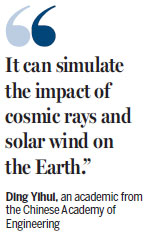Software prototype unveiled to study the Earth
The prototype of a supercomputer system to explore the Earth and provide possible solutions for reducing environmental risks, including air pollution and global warming, was unveiled in Beijing on Wednesday.
The prototype of the earth system numerical simulator was jointly launched by the Chinese Academy of Sciences, China's top science think-tank, and Sugon Information Industry Co Ltd at the Zhongguancun Science Park or Z-Park in the capital's Haidian district.
The Institute of Atmospheric Physics under the CAS has developed its first version of the software that can be used on the prototype.
The prototype will be used to study the Earth in terms of interplay between different aspects like the lithosphere, hydrosphere, biosphere and the atmosphere, said Zeng Qingcun, a scientist with expertise in atmospheric dynamics.
The computer system will be able to process mass data and information, which is the precondition for scientists to discover rules in the function of the Earth system and the impact of human activity on the planet, he said.
The research will seek to establish an early-warning mechanism for possible natural disasters and environmental risks, said Zeng.
China's progress in Earth sciences can help political decision-making, especially in terms of environmental diplomacy, he said.
"Some neighboring countries accused China of causing sandstorm in their homelands, which is ridiculous as China is an 'import' instead of 'export' country of sandstorm, but we need solid statistics to dismiss such accusations," he said.
Ding Yihui, an academic from the Chinese Academy of Engineering, regarded the supercomputer system as a "remarkable" achievement in fundamental science.
"It can simulate the impact of cosmic rays and solar wind on the Earth, which can enable scientists to anticipate the climate change in at least three decades and such anticipation is vital to improving the environment," he said.
Zhu Jiang, head of the Institute of Atmospheric Physics under the CAS, told China Daily that the program can contribute to the municipal government's efforts to build the capital city into the national hub of technological innovation center. Zhu revealed that his institute, the National Development and Reform Commission and the Beijing municipal government will cooperate to establish an assembly base for large scientific devices in Huairou district.
hedan@chinadaily.com.cn

(China Daily 09/28/2015 page24)














